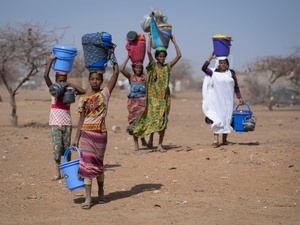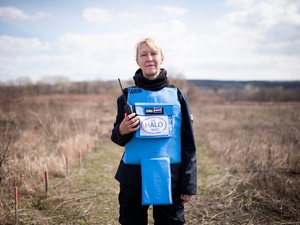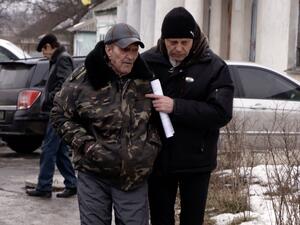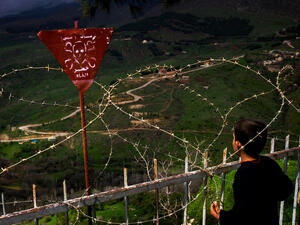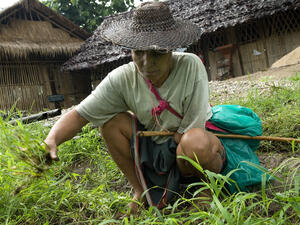Circus act triggers mine awareness in Ethiopia
Circus act triggers mine awareness in Ethiopia
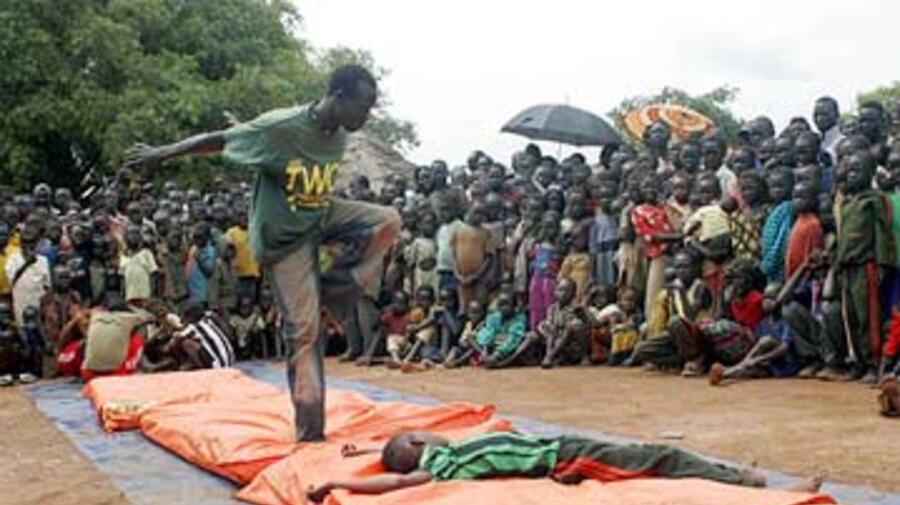
One of the circus actors tiptoes towards a mine "victim". The audience laughs, cries and shouts, but hopefully the message will stay vividly in their minds.
SHERKOLE, Ethiopia, September 15 (UNHCR) - A crowd of more than 500 Sudanese refugees waits in anticipation as 19-year-old Dawit tries to light a temperamental firework backstage. Meanwhile, James, 22, wanders onto the stage, imitating a community elder and drawing laughter and attention. BANG! Dawit is successful. On cue, James hurls himself into the air and the circus has begun.
As the shock and laughter settle, the audience is immediately drawn to James, lying motionless and face down on the ground. Wounded and shaken by the "explosion", he slowly rises to address the audience in Arabic: "While you should have fun, the following performance contains crucial messages about landmines and unexploded ordnance (UXO), which are a real threat to us in Sudan. So please have fun and listen, thank you."
This performance by 28 refugee youths is a result of the Sherkole Mine Risk Education (MRE) Circus workshop held recently in UNHCR's Sherkole camp in western Ethiopia, near the Sudanese border. The six-week workshop includes gymnastics, theatre, playwriting and mine risk education training.
Fernando Protti-Alvarado, Deputy Representative of UNHCR's Regional Liaison Office for Africa based in Addis Ababa, explains the need for mine awareness: "Prospects for return to South Sudan are ripe, with the formation of a government of national unity which has ended over two decades of deadly civil war. But in addition to the lack of infrastructure, mines remain a major deterrent, hence the importance and relevance of systematic and appealing mine risk education activities."
The overwhelming majority of refugees in Sherkole camp hail from the Upper Nile and Blue Nile regions, two of the most heavily-mined areas in South Sudan. According to Protti-Alvarado, there is limited area-specific information for returning refugees, and only estimates exist on the number of landmines and UXO scattered in the region.
Prior to the recent workshop, the refugees' knowledge of landmines and UXO had been based primarily on folklore and anecdotes.
"During the conflict, they dropped bombs filled with objects that resembled kitchen utensils and those who attempted to use them in the kitchen were injured or killed by an explosion," says George, a community leader. He explains that in rural South Sudan where resources are scarce, small metal objects such as UXO can serve a purpose in the kitchen. "Such stories represent a large extent of the education about lakam (Arabic for landmine/UXO) in the camp," he sighs.
Though the refugees seem to be aware of the presence of lakam in Sudan, they do not know any details or preventive methods. The MRE Circus workshop seeks to build upon the existing knowledge of lakam as well as the success of a circus education campaign on HIV/AIDS in Sherkole camp earlier this year.
"There is not much to do here in the camp and the circus is both entertaining and educational," says James, a 24-year-old refugee, about the HIV/AIDS Education Circus that performed in January. "People are having fun and learning about HIV/AIDS."
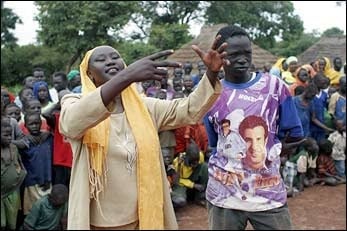
After every show, the audience is asked to reflect on the lessons learnt. Although shy at first, this Sudanese woman describes the dangers of the mines and UXO in her homeland.
The shows and workshops are run by Circus Debub Nigat, which has been performing and educating rural and urban communities throughout Ethiopia since 2003, and is now reaching out to refugees and internally displaced people. Its performances focus on HIV/AIDS awareness education and issues like female genital mutilation, alcohol and drug abuse, refugee repatriation, and most recently, mine risk education.
In preparation for the recent MRE Circus workshop, a team from the Awassa Children's Project and Circus Debub Nigat held auditions at Sherkole primary school. Over 400 children and youths showed up. The excitement and crowds proved to be too much, and auditions had to be cancelled due to safety concerns.
Finally, 28 children and youths from various tribal backgrounds were selected on the merit of their gymnastic and theatre skills. For six weeks, they attended daily training sessions on mine risk education, and learnt about the leadership, work ethics, teamwork and creativity needed to create and sustain a circus group in Sherkole.
The resulting show follows a group of refugees on their way home and their encounters with landmines and UXO en route. The hour-long performance offers basic mine awareness tips that could make the difference between life and death for returning refugees. These include ways to recognise warning signs indicating the presence of landmines/UXO, steps to take if one encounters a landmine/UXO, and how to avoid landmines, such as not travelling at night, staying on the main roads, and not letting children play with foreign objects.
The audience at Sherkole, comprising mostly women and children, enjoy and appreciate the hard work of the cast. Performances are filled with laughter and pride as refugees take the first steps to ensure a safe journey home.
At the end of the MRE Circus workshop, emotions are mixed among the cast. There is much excitement as they have performed for more than 3,000 of their friends and family, and in the process, become a part of something creative and fulfilling - a rare opportunity for youths in a refugee camp.
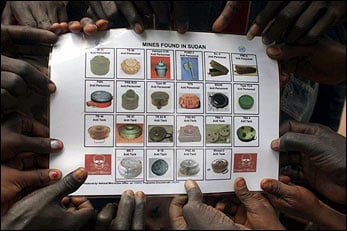
The acrobats of Sherkole Circus show the inspiration for their theatre props - an anti-landmine poster.
With the support of UNHCR and implementing agencies, the young Sherkole Circus could become a valuable community tool. It can also help refugee youths to develop the skills and confidence that will help them rebuild their war-torn homeland. The UN refugee agency plans to include the circus' activities in its upcoming MRE programme in order to promote mine risk education through all possible means.
Sherkole camp, opened in 1997, is one of five camps in western Ethiopia that together host nearly 80,000 refugees.
By John McKay in Sherkole, Ethiopia


